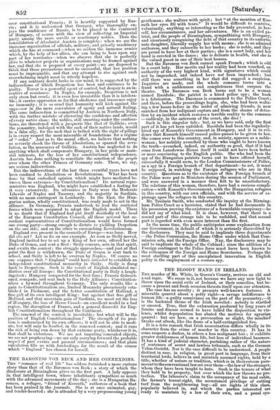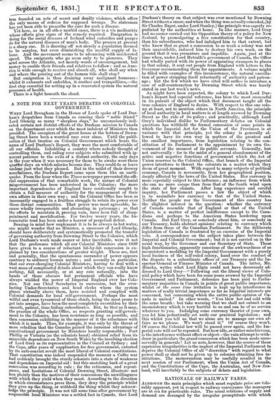TH.E BLOODY HAND IN IRELAND
THE murder of Mr. White, in Queen's County, revives an old and a sad topic. We recur to it, not because we have any new light to throw upon the social evils of Ireland, or their remedies, but be- cause a present and fresh occasion thrusts itself upon our attention.
The case has no novelty ; it presents well-known features. A. miserable quarrel about a petty right—a savage indifference to human life—a guilty connivance on the part of the peasantry,—it is the haeknied theme of the Irish novelist: nobody is startled or amazed. True, that the exhaustion produced by long years of famine and disease seemed to have lulled the disposition to vio- lence, whilst depopulation has abated the motives for agrarian quarrel : but see how, on a provocation so slight, the mischief breaks out afresh, like the flame of a half-extinguished fire.
It is a trite remark that Irish assassination differs wholly in its character from the crime of murder in this country. It has in some respects a darker, in others a less malignant hue ; it exhibits greater recklessness of human life, but less of individual baseness. It has a kind of judicial character, partaking rather of the nature of sentences of secret and lawless tribunals, such as the German Vehm-Gericht. Nor is the case difficult to be understood. 4. people distinct in race, in religion, in great part in language, from their territorial lords, believe in and maintain assumed rights, held by a title, whether of nature or tradition, which is in their esteem para- mount to the conventional law set over them—the law of the stranger, whom they have been taught to hate. Such is the tenure of what they hold to be property, but over which the law throws no pro- tection. The labourer's claim to the occupancy of his mud cabin, the farmer's tenant-right, the accustomed privilege of cutting turf from the neighbouring bog—all are rights of this class, popularly believed in, and which the parties interested are ready to maintain by a law of their own, and a penal sys-
tern founded on acts of secret and deadly violence, which offers the only means of redress for supposed wrongs. No statesman has yet been able to prescribe the cure or such a disease. Yet here, as in all other morbid cases, there is a vis medicatrix whose efforts give signs of the remedy required. Emigration is doing for the social diseases of Ireland what sudorifics and purges do for the natural diseases of man's body. The process at present is a sharp one. It is drawing off not merely a population deemed to be surplus, but even diminishing the needful supply of la- bour. And the movement seems to be advancing with accelerated speed. The emigrants who go seem only to be pioneers. They send across the Atlantic, not merely words of encouragement, but money to enable their friends and relatives to follow : and as Ame- rica is wide enough to receive and absorb all, who shall say when and where the pouring out of the human tide shall stop ? But emigration is thus draining away malignant humours: whilst it exhausts and enfeebles, it soothes and tranquillizes,—the first step essential for setting up in a renovated system the natural processes of health. There is a light beneath the cloud.



























 Previous page
Previous page